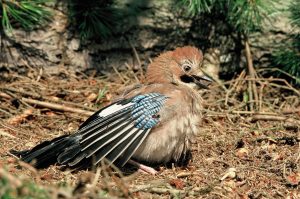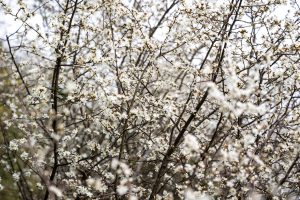Suddenly its warmer sunnier and the birds are singing
It might only be a brief and unusually warm spell in the middle of March, but after the rain and winds of recent months doesn’t it make us all feel better! And the warmer and sunnier days have also brought our garden birds into full song, with the process of males trying to pair up with females now well underway.
One positive consequence of the sort of winter we’ve just had – so mild and wet as opposed to cold and icy – is that it’s given a number of bird species the opportunity to recover in numbers. This is because the previous few relatively cold and harsh winters have inevitably reduced the numbers of very small song birds – in particular Wrens whose numbers can be decimated by up to 95% by prolonged spells of sub-zero temperatures – and therefore a mild winter means more survive for the breeding season.
Despite the above though, our customers are telling us that they’ve got less birds in their gardens right now compared to previous years. And we know this is true because the whole of the bird food industry is currently selling less product compared to the last few years! So what’s going on? Well although more small song birds will have survived the winter months compared to previous years, they’re less reliant on food put out in gardens. So if you take Blackbirds as a good example, if the ground is frozen and once the berries have all been eaten from trees and shrubs come late winter, then they become very dependent on food put out in gardens – e.g. sunflower hearts which are perfect for them. But right now the ground is far from frozen and it’s also fairly wet. This therefore means that earthworms are available not too far under the surface of the ground in parks, farmland and woods etc. – not just our gardens.
But our garden birds will still benefit from a plentiful supply of food, and actually increasingly so as the breeding season gets fully underway and chicks start to hatch. And although we make a big play of it every year – and for very good reason – please DO, if you don’t already, put out live mealworms and in particular once there are young in the nests. For species such as House Sparrow, Robin, Blackbird and Starling, being able to feed live mealworms to their young can make a huge difference to breeding success. In fact we know of one customer who roughly trebled his local population of House Sparrows in around the same number of years by putting out live mealworms throughout the breeding and fledgling seasons. So please give the same a go in the crucial months ahead!
One positive consequence of the sort of winter we’ve just had – so mild and wet as opposed to cold and icy – is that it’s given a number of bird species the opportunity to recover in numbers. This is because the previous few relatively cold and harsh winters have inevitably reduced the numbers of very small song birds – in particular Wrens whose numbers can be decimated by up to 95% by prolonged spells of sub-zero temperatures – and therefore a mild winter means more survive for the breeding season.
Despite the above though, our customers are telling us that they’ve got less birds in their gardens right now compared to previous years. And we know this is true because the whole of the bird food industry is currently selling less product compared to the last few years! So what’s going on? Well although more small song birds will have survived the winter months compared to previous years, they’re less reliant on food put out in gardens. So if you take Blackbirds as a good example, if the ground is frozen and once the berries have all been eaten from trees and shrubs come late winter, then they become very dependent on food put out in gardens – e.g. sunflower hearts which are perfect for them. But right now the ground is far from frozen and it’s also fairly wet. This therefore means that earthworms are available not too far under the surface of the ground in parks, farmland and woods etc. – not just our gardens.
But our garden birds will still benefit from a plentiful supply of food, and actually increasingly so as the breeding season gets fully underway and chicks start to hatch. And although we make a big play of it every year – and for very good reason – please DO, if you don’t already, put out live mealworms and in particular once there are young in the nests. For species such as House Sparrow, Robin, Blackbird and Starling, being able to feed live mealworms to their young can make a huge difference to breeding success. In fact we know of one customer who roughly trebled his local population of House Sparrows in around the same number of years by putting out live mealworms throughout the breeding and fledgling seasons. So please give the same a go in the crucial months ahead!


